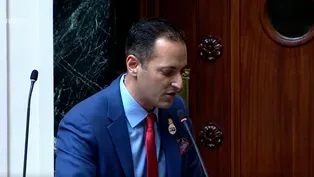
National Atrial Fibrillation Awareness Month
Clip: Season 3 Episode 82 | 3m 9sVideo has Closed Captions
September is National Atrial Fibrillation Awareness Month.
September is National Atrial Fibrillation Awareness Month. A doctor with Norton Heart & Vascular Institute talks about the symptoms of AFib and what you can do about it.
Problems with Closed Captions? Closed Captioning Feedback
Problems with Closed Captions? Closed Captioning Feedback
Kentucky Edition is a local public television program presented by KET

National Atrial Fibrillation Awareness Month
Clip: Season 3 Episode 82 | 3m 9sVideo has Closed Captions
September is National Atrial Fibrillation Awareness Month. A doctor with Norton Heart & Vascular Institute talks about the symptoms of AFib and what you can do about it.
Problems with Closed Captions? Closed Captioning Feedback
How to Watch Kentucky Edition
Kentucky Edition is available to stream on pbs.org and the free PBS App, available on iPhone, Apple TV, Android TV, Android smartphones, Amazon Fire TV, Amazon Fire Tablet, Roku, Samsung Smart TV, and Vizio.
Providing Support for PBS.org
Learn Moreabout PBS online sponsorshipSeptember is National Atrial Fibrillation Awareness Month.
A-fib is the most common form of an irregular heartbeat, affecting more than 37 million people worldwide.
Dr. Kevin Thomas, A cardiac electrophysiologist with Norton Heart and Vascular Institute, talked to us about some of the symptoms of AFib and what you can do about it.
More on that in tonight's look at medical news.
So atrial fibrillation is an abnormal heart rhythm that originates from the upper chambers of the heart.
The upper chambers can go very fast and irregular and that can drive the bottom chamber to go fast and irregular as well.
It is the most common abnormal heart rhythm that we encounter.
It affects currently probably around somewhere between 4 to 6 million Americans, and that's expected to double by the year 2030 and triple by the year 2050.
We talk about the overall risk factors like getting older or carrying too much weight, having high blood pressure, diabetes, sleep apnea.
But there are certain things that can trigger atrial fibrillation occurrences, even in the absence of those risk factors infections, surgical procedures, acute alcohol intoxication are things that can do that.
Other medications that patients may be taking for other disorders are the vast majority of people do have symptoms from it.
Those symptoms can range from palpitations, feeling of irregular heartbeat, shortness of breath, lightheadedness, dizziness, excess fatigue.
There are some patients who are completely asymptomatic, which sometimes make the diagnosis of A-fib more difficult.
You know, atrial fibrillation is not a life threatening condition.
However, it does have many consequences, the foremost of which is it increases the risk of having a stroke.
And so the primary treatment goal for atrial fibrillation is to reduce the stroke risk.
We do that primarily with medications which thin the blood and reduce the risk of stroke.
People who have atrial fibrillation are at a 5 to 6 times increased risk of stroke over the general population.
So while we will frequently treat people for the A-fib symptoms of medications and surgical procedures, stroke prevention remains our primary treatment goal.
As far as treatment of A-fib itself, that's guided primarily by how symptomatic the person is and other risk factors that they have.
In some patients who don't feel they're A-fib, they may just need certain medications to control their heart rate.
Most of our patients, though, who do feel the A-fib feel better in normal rhythm, and so their treatment for them is either a combination of medications to restore and keep them in normal rhythm and surgical procedures that are minimally invasive.
And if you are feeling any cardiac symptoms, symptoms like palpitation racing heartbeats, irregular beats, skip beats, please seek medical attention from your primary care provider, immediate care, or even the emergency room.
Even if it's not atrial fibrillation, your symptoms could represent another cardiac condition that might need evaluation and treatment.
Grossberg Resigns from Task Force
Video has Closed Captions
Clip: S3 Ep82 | 54s | A state lawmaker steps down from an anti-semitism task force. (54s)
Headlines Around Kentucky (9/24/2024)
Video has Closed Captions
Clip: S3 Ep82 | 2m 48s | A look at stories making Headlines Around Kentucky. (2m 48s)
KY Firefighters Discuss Pensions
Video has Closed Captions
Clip: S3 Ep82 | 1m 13s | KY firefighters tell state lawmakers their retirement and healthcare plans aren't working for them. (1m 13s)
Video has Closed Captions
Clip: S3 Ep82 | 4m 1s | A Kentucky university is prepairing students to find careers in the aerospace field. (4m 1s)
Video has Closed Captions
Clip: S3 Ep82 | 3m 28s | Some Kentucky students are getting hands-on experience. (3m 28s)
Video has Closed Captions
Clip: S3 Ep82 | 4m 35s | KET speaks with the Hollywood legend about his new documentary. (4m 35s)
Providing Support for PBS.org
Learn Moreabout PBS online sponsorshipSupport for PBS provided by:
Kentucky Edition is a local public television program presented by KET

















